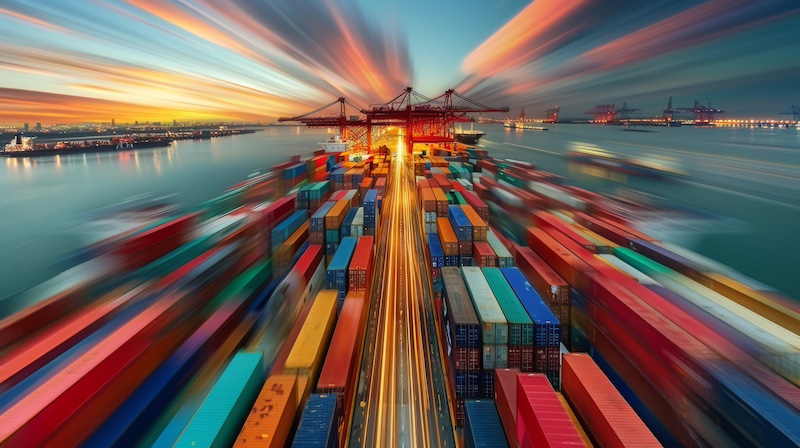Third year law student Stefanos Papanikolaou examines President Trump’s trade policy in the context of international trade law

International trade law is built on three core principles that guide how states handle their bilateral and multilateral agreements: national treatment, most-favoured-nation (MFN) status, and fair and equitable treatment. These principles are central to two key agreements — the General Agreement on Tariffs and Trade (GATT) and the General Agreement on Trade in Services (GATS). GATT focuses on trade in goods, aiming to reduce tariffs and eliminate trade barriers, while GATS governs trade in services, encouraging fair access, openness, and transparency.
The national treatment principle imposes a negative obligation on states, ensuring that imported goods and services are not treated less favorably than domestic ones. Similarly, the MFN principle dictates that any preferential treatment granted to one World Trade Organisation (WTO) member must automatically extend to all other member states. Finally, the principle of equal treatment prohibits discrimination in areas such as foreign investments and other bilateral or multilateral agreements. Within this framework, states are expected to comply with these commitments.
Naturally, there are exceptions: governments may invoke reasons of public health, environmental protection, and national security. Regarding intellectual property, specific provisions ensure protections for domestic rights holders. Additionally, countries have the authority to enter into free trade agreements (FTAs) — such as the European Union — and prioritise their national interests, provided they avoid abusive practices.
The rapid developments in the global economy, the unorthodox policies of the American president, and Europe’s ongoing inertia have undoubtedly caused turmoil — not only in the political arena but across the entire world, which endures this uncertainty with a stoic patience, awaiting Trump’s next move. The truth is that he has not disappointed in this regard. His statements did not remain mere rhetoric but were swiftly translated into action within the very first month of 2025.
Want to write for the Legal Cheek Journal?
Find out moreWhen the WTO was established in 1995 following the Uruguay Round (1986–1994), which itself stemmed from trade negotiations dating back to 1947 with GATT, its primary goal was to reduce tariffs, facilitate international trade, and pave the way for global economic growth. It called on states to avoid protectionist policies and promote open markets.
On the other hand, the 1992 Rio Declaration aimed to reinforce the pursuit of sustainable development. And yes, as paradoxical as it may seem today, with war zones proliferating, multiple fronts open across Europe and the Middle East, and domestic unrest escalating in many countries, states had already pledged back in 2015 to implement the United Nations’ 17 Sustainable Development Goals. A decade later, instead of witnessing radical improvements, we are experiencing gradual deterioration.
With this extensive introduction in mind, it is necessary to address the measures that the US president seeks to implement. The “America First Trade Policy” represents a revisionist approach that some have labeled a protectionist move. The concern here, however, lies in the inevitable consequences this shift will have — not only for Trump’s geopolitical rivals and competitors but for the entire world. While the US has identified some justification for its forthcoming decisions—this does not eliminate the possibility of countermeasures being introduced in response to Washington’s aggressive stance. And indeed, the 25% tariff hike on Canada and Mexico, along with the 10% increase on Chinese imports, can be interpreted as an explicit act of aggression and a confirmed trigger for economic recession in both countries.
At the same time, however, these tariffs pose a global threat rather than a legitimate attempt to preserve existing trade arrangements (such as the USMCA, formerly NAFTA, which Trump himself renegotiated in 2020 and now seeks to reopen for further discussions). All of this is happening at a time when global stability is desperately needed.
There is no doubt that the US’s actions raise serious questions about its compliance with international obligations. For example, Trump’s intimidation tactics — such as the threat of tariffs on Colombia as leverage on immigration policy, an issue unrelated to trade — could be interpreted as an abuse of power. The International Emergency Economic Powers Act (IEEPA), which Trump invokes, is intended for economic and political crises concerning national security, not for advancing domestic economic interests. And while Republican voters in the U.S. seem satisfied with Trump’s efforts to deliver on his campaign promises with a recent YouGov poll showing that they overwhelmingly support tariffs, Democrats express concern over the risks posed by his aggressive rhetoric.
The question that remains open, at least for now, is whether this American stance constitutes lawful economic policy tools or flagrant violations of international trade law.
Stefanos Papanikolaou is a third-year law student at the Aristotle University of Thessaloniki and an active member of the European Law Student Association. He has a strong interest in international trade law and global development policy and recently served as an official delegate at the 62nd United Nations Framework Convention on Climate Change session in Germany.
The Legal Cheek Journal is sponsored by LPC Law.



